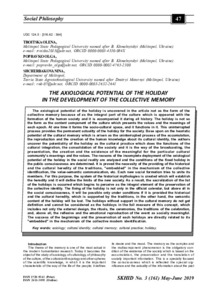Please use this identifier to cite or link to this item:
http://elar.tsatu.edu.ua/handle/123456789/9066| Title: | The axiological potential of the holiday in the development of the collective memory |
| Other Titles: | Аксіологічний потенціал свята у розвитку колективної пам'яті |
| Authors: | Troitska, O. Popravko, Olha Поправко, Ольга Вікторівна Поправко, Ольга Викторовна Shcherbakova, Nina Щербакова, Ніна Володимирівна Щербакова, Ніна Володимирівна Щербакова, Нина Владимировна |
| Keywords: | axiology;cultural identity;cultural memory;cultural practice;holiday;аксіологія;культурна ідентичність;культурна пам'ять;культурна практика;свято |
| Issue Date: | 2019 |
| Series/Report no.: | СХІД: аналітично-інформаційний журнал. Філософські науки;№ 3 (161) травень-червень SKHID: analytic and informative journal. Philosophic sciences;№ 3 (161) may-june |
| Abstract: | EN: The axiological potential of the holiday is uncovered in the article not as the form of the collective memory because of as the integral part of the culture which is appeared with the formation of the human society and it is accompanied it during all history. The holiday is not so the form as the content component of the culture which presents the values and the meanings of each epoch. At one time it forms the socio-cultural space, and it functions in it. This uninterrupted process provides the permanent actuality of the holiday for the society. Base upon on the heuristic potential of the cultural memory which is arisen as the uninterrupted process of the accumulation, the reproduction and the creation of the human knowledge about its cultural identity, the authors uncover the potentiality of the holiday as the cultural practice which does the functions of the cultural integration, the consolidation of the society and it is the way of the broadcasting, the presentation, the creation and the existence of the meaningful for the particular cultural community's meanings and the values. The reasons of the incomplete deployment of the axiological potential of the holiday in the social reality are analyzed and the conditions of the fixed holiday in the public consciousness are determined. It is proved the necessity of the providing of the historical and the cultural heredity of the traditions, "embedded" in the mechanism of the collective identification, the value-semantic communication, etc. Each new social formation tries to unite its members. For this purpose, the system of the historical mythologies is created which will establish the heredity and it will define the limits of the new society. As a result, the sacralization of the list of the holidays is occurred which begins to perceive as the integral element of the preservation of the collective identity. The fixing of the holiday is not only in the official calendar, but above all in the social consciousness, it will be possible only under conditions if it is provided the historical and the cultural heredity, which is supported by the traditions, in the other hand, the semantic content of the holiday will be lost. The holidays without support in the cultural memory do not get definition and cannot be considered as the holidays in the full measure of this concept, which includes not only the external design, the rituals, the ceremonies, the traditions of the celebration, and, above all, the reflexive and the emotional reproduction of the event as socially meaningful. The success of the beginnings and the preservation of each holidays are directly related to its "embedded" in the mechanism of the collective modern identification. UK: У статті розкрито аксіологічний потенціал свята та його роль у розвитку культурної пам'яті. Спираючись на аналіз евристичного потенціалу культурної пам'яті, що постає неперервним процесом акумуляції, відтворення і створення знання людини про свою культурну ідентичність, автори експлікують потенційність свята не стільки як форми культурної пам'яті, скільки як культурної практики, що спирається на канони постмодернізму, а саме на постметафізичне мислення, на відмову від логоцентризму, на лінгвістичний і комунікативно- діалогічний поворот у розумінні свята як способу інтеграції та консолідації суспільства. Обґрунтована роль свята як конструкта трансляції, презентації і творення значущих для певної культурної спільноти у часі й просторі смислів і цінностей культурного буття людини. Проаналізовано причини неповного розгортання аксіологічного потенціалу свята у соціальній дійсності, що пов'язані насамперед з пануючим розумінням свята у межах презумпції єдиної системно-концептуальної моделі, яка не враховує дискурсивні, екзистенціально-інформативні (діалогічні) смисли-цінності, а також не спирається на сучасні феномени пріоритету простору (тут і тепер) на противагу часовому виміру з яким пов'язана пам'ять. Визначено умови закріплення свята у суспільній свідомості. Доведена необхідність забезпечення історичної й культурної спадковості через "вбудованість" у ме- ханізм колективної ідентифікації ціннісно-смислового потенціалу спілкування. Експлікована роль свята як конструкту реалізації людиною власного життєвого світу й діалогічності натхнення. |
| URI: | http://elar.tsatu.edu.ua/handle/123456789/9066 |
| Appears in Collections: | кафедра Суспільно-гуманітарні науки |
Files in This Item:
| File | Description | Size | Format | |
|---|---|---|---|---|
| стаття щербакова.pdf | 427.09 kB | Adobe PDF |  View/Open |
Show full item record
CORE Recommender
???jsp.display-item.check???
Items in DSpace are protected by copyright, with all rights reserved, unless otherwise indicated.
